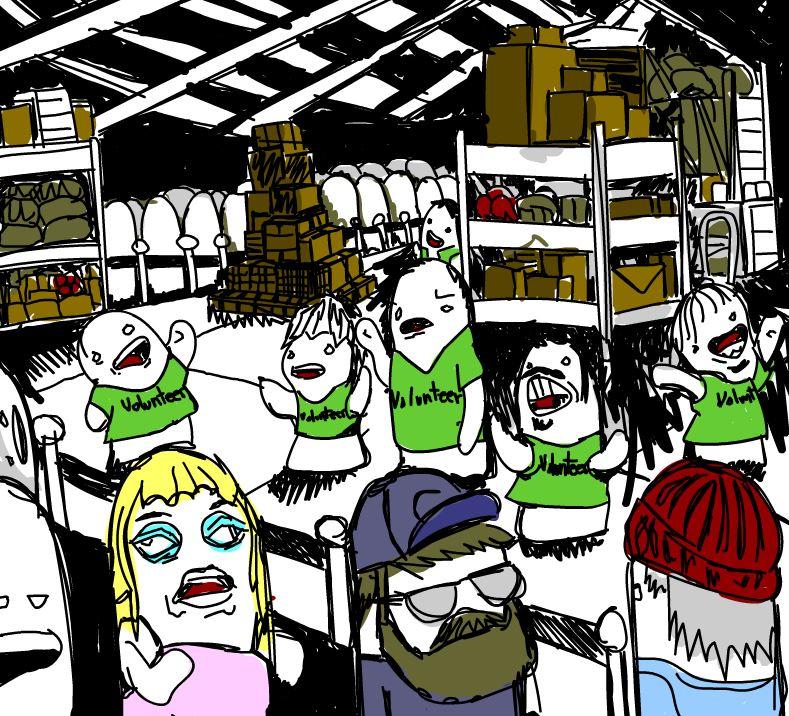Volunteer, but not on Thanksgiving
(Illustration by Garrett Aguilar | Staff Illustrator)
November 20, 2017
It’s Thanksgiving, and you’re bustling around the sweltering, crowded soup kitchen, maneuvering around your fellow volunteers, taking up practically every inch of space on the floor. Someone jostles your elbow, almost causing you to spill the giant pot of soup you’re carrying around.
Despite the struggle, you’re at least comforted by the thought that you’re doing a good deed for the impoverished in your community today — you wouldn’t even spare another thought to consider how empty and barren this same kitchen looks every other time of the year.
But even with the best of intentions, volunteering like this during the holiday season typically does more harm than good.
Around Thanksgiving in particular, volunteers flock to soup kitchens and inundate food pantries with donations. Everyone during the holidays has the same idea — that they should share the spirit of gratitude by giving back to the rest of their community. But this overflow of volunteers actually harms efficiency of operation, and the surplus of food gathered on the holiday is often wasted.
Midnight Mission, a charity operation in Los Angeles, is a particularly striking example of this problem. Spokeswoman Georgia Berkovich told LA Weekly in 2015 that the large volume of volunteers forces the charity to focus on Thanksgiving — as opposed to the needy populations they’re actually trying to serve.
“The most difficult thing about these holidays is not feeding thousands of our homeless and near-homeless community but trying to accommodate the hundreds of volunteers that want to volunteer on Thanksgiving and the day after,” Berkovich said.
Most small, local food banks and soup kitchens can accommodate a couple dozen volunteers at most. Even Midnight Mission, which serves meals to hundreds of homeless people daily, has limited access to space and resources. Training newcomers for a one- or two-day stint simply isn’t in the cards.
As an alternative to volunteering during the holidays, people should consider focusing their generosity on other parts of the year that see less volunteerism and donate their time and effort with greater regularity throughout the calendar year — at times when homeless and impoverished people are struggling a great deal more.
“The biggest need we have is the breakfast and lunch services on weekdays and the breakfast service on weekends [throughout the year],” Berkovich added.
Federal holidays, too, such as Independence Day, Labor Day and Memorial Day are far better opportunities to step up and volunteer — many food pantries and soup kitchens are alarmingly understaffed during these times.
If you still consider giving to the less fortunate during Thanksgiving a matter of necessity, the solution is simple — write a check. A dollar goes a long way toward fighting starvation and doesn’t carry with it the effort and inconvenience of having to train a new volunteer.
And if you’re not keen on hand-writing a check, there are plenty of other ways to satisfy your craving for charitable giving. Technological advancement has put a modern spin on the charity game, vastly improving the way in which we distribute capital.
Websites such as GoFundMe, CrowdRise and GiveForward make it easier than ever to give to the cause or charity of your choice. There are ways to directly sync your Facebook account with charitable organizations, where you can not only donate from a social media platform, but can also share your generosity with your hundreds or thousands of friends — and encourage them to pitch in as well.
Charity is a practice that builds social cohesion and more fairly allocates wealth throughout communities. And those who engage in volunteer work might be well-meaning, virtuous human beings, but their volunteer work, specifically during the holiday season, is ultimately misplaced generosity.
Difficulties from society’s insistence that individuals volunteer their time and effort specifically on holidays like Thanksgiving go beyond issues of efficiency and effectiveness. The assumption amounts to a scathing indictment of our values and expectations as a society. Even though we’re social creatures, it seems no one expects us to feel responsibility for the poorest among us except on a handful of days throughout the year.
Of course, if we as a culture could establish a norm of volunteering and giving to the less fortunate on a more regular basis, we wouldn’t need to place so much emphasis celebrating rare generous acts during the holiday season.
Perhaps if we as a society refuse to embrace our social dilapidation and once again view charity as, not a special occasion, but as a social expectation, we’d be able to more directly mend the wounds of the less fortunate wrought by classism, poverty and income inequality.
This Thanksgiving, before you pat yourself on the back for donating a can of beans to your local food bank, take a moment to think about the people who would be just as grateful for a meal on all the other 364 days of the year.
And after you mark your calendar for one of those days, you can sit back and enjoy your meal knowing that your help will make a difference where it’s needed the most.
Write to Neena at [email protected].



